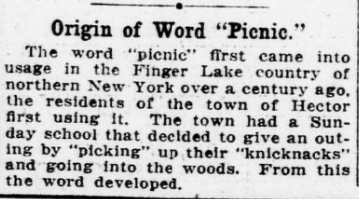
In the years leading up to Prohibition in the United States, people would write in their complaints against alcohol to the newspapers. The temperance women (part of the movement that stood against drinking alcohol) had a strong hold in the late 1800s. Women would stand outside of bars, harassing anyone trying to enter them and taking down their names. It was only inevitable that the temperance people would also start to attack the wine being offered at church services.
This article, found in The Carbon Advocate, was published on August 29, 1874.

Intoxicating Wine at the Lord’s Supper.
By T.R. Welch, M.D.
Let me ask my brethren to ponder the following, to my mind serious objections to the use of intoxicating wine at the celebration of the Lord’s Supper. I believe they will then earnestly seek to dispense with it, and use the simple, pure, unfermented “fruit of the vine” — the innocent, unvitiated, un-intoxicating “blood of the grape.”
1. Intoxicating wine at the Sacrament of the Lord’s Supper is certainly an offense to those whose taste is unperverted. How many I have heard complain of its disgusting taste and smell [LOL! Yeah, right.], and declare that they take it only as they take noxious medicine — because they think it a duty! Should we thus needlessly offend?
2. It perverts the taste, so that this repugnance to it is gradually overcome, till finally a liking is engendered that is abnormal, pernicious unsafe, sometimes causing drunkenness and destroying body and soul. Brethren, is this wise?
3. It is imminently dangerous to the reformed inebriate — especially if he still locks arms with its bosom companion, tobacco — his appetite for alcohol is not destroyed; it sleeps. The very taste, or even smell, of this deadly poison will therefore, sometimes irresistibly arouse the appetite, and lead the victim to destruction. We have sad instances of this, and also of many who, from fear of this avoid the sacrament as a dangerous place, Brethren, is this right?
4. It tends to make intoxicating wine respectable. The association of whiskey, rum and gin with bar rooms and vulgar revelings degrades these to the level of obscenity and crime, so that they are repulsive to the Christian’s very instinct; but the association of wine (which is just as truly intoxicating) with the House of God and the Holy Sacrament elevates it to something, akin to sacredness, and thus tends to give it respectability as a common beverage. Brethren, is not this so?
5. It cripples the influence of the Church in the temperance cause; for it is inconsistent for Christians to exhort sinners to “abstain from all that can intoxicate,” upon the plea that all intoxicants are a poison and a curse, and yet, at the same time, invite every man, woman, and child of the Church to drink one of the most popular and therefore the most dangerous of them all! And this as a religious duty! How can we meet this glaring inconsistency?
6. It is making a sacred use of a wine which God has cursed. It must be clear that there are two very distinct classes of wine described in the Bible, though both are translated by the same name, one unfermented, non-alcoholic, and therefore innocent and approved; and the other fermented, or alcoholic, and therefore poisonous and condemned, — one used as the emblem of God’s blessing, the other of his wrath. Brethren is the latter the wine for the Lord’s table?
7. Fermented wine, when used to typify the shed blood of the Crucified One, is false in its character. The process of fermentation is the process of putrefaction; the result is the poisonous cup of death. It is not this, but the wine as taken from the fresh ripe grape, that is made typical of the pure, living blood of the Lamb of God, the drinking of which imparts life eternal. Brethren, is it not revolting – night blasphemous — to give to him that would sup with his Lord “the cup of His wrath,” in place of “the cup of His blessing?”
8. The use of fermented wine as commemorative of our Savior’s last Passover Supper, is inconsistent, both as to the nature of the wine and the character of the occasion it is used to celebrate. For fifteen hundred years ago the Jews had symbolized the eating the body and drinking the blood of the Lamb of God, using at this feast only that which was unleavened. How could Christ then have used any other than the unfermented, fresh “fruit of the vine?” Brethren, should we not now symbolize the fresh, flowing life-giving blood of the Son of God by using the wine as handed us by His Father in the pure “blood of the grape,” unvitiated by the poisonous process of putrefaction?
9. It is unnecessary to use fermented wine. The approved, innocent, delicious wine, commended in the Scripture, can be made now as well as in the ancient times. Every housewife preserves the fruit — the same process will preserve the juice.

